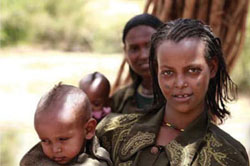Vaccine quality
Using vaccines of high quality is very important in order to protect your community against vaccine-preventable diseases. Using poor quality vaccines can have an adverse effect on the individual, and is also likely to upset the community as a whole, for example if there is an outbreak of a disease that should have been prevented by your immunization programme (Figure 7.1).

The first check on the quality of vaccines supplied to health facilities in Ethiopia is made by a national body authorised for this purpose. Other checks follow on their condition at every stage in the transport to health facilities around the nation. However, once vaccines are in your care, you are responsible for maintaining their quality by storing them at an appropriate temperature until they are used. All vaccines are sensitive to heat, most cannot be frozen, and some are damaged by bright light; so it is crucially important to ensure that they are not exposed to heating or freezing, and are kept out of direct sunlight. Therefore, as you learned in Study Session 6, the cold chain should be maintained at all times, from the original manufacturer of the vaccine until the moment of administration to your clients.